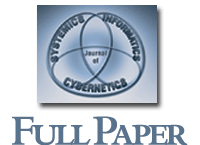|

General Joint Sessions and Workshops of WMSCI 2015 and its Collocated Events
July 12-15, 2015 ~ Orlando, Florida, USA
|
Practical Approaches to Developing Global Competency across the Disciplines
Dr. Houman A. Sadri, Department of Political Science, College of Sciences, University of Central Florida, USA
Dr. Madelyn Flammia, Department of English, College of Arts and Humanities, University of Central Florida, USA
|
Video
Video
Bio
Bio
Abstract
Abstract
|
|
|
Dr. Houman Sadri is an Associate Professor in the Department of Political Science at the University of Central Florida. His research interests include Middle East Politics, Terrorism, Globalization, American Foreign Policy, and International Relations & Organizations. Dr. Sadri is the Founder and Faculty Advisor of the UCF Model United Nations Program since 1995, and his students have won many awards in regional and national Model U.N. competition throughout the USA. He is the co-author of Intercultural Communication: A New Approach to International Relations and Global Challenges.
Dr. Madelyn Flammia is an Associate Professor in the Department of English at the University of Central Florida in Orlando, Florida. She teaches both graduate and undergraduate courses in Technical Communication. Her research interests include international technical communication, visual communication, and global virtual teams. Dr. Flammia has given presentations on intercultural communication at professional conferences and for corporate audiences. She is the co-author of Intercultural Communication: A New Approach to International Relations and Global Challenges and the editor of the Society for Technical Communication anthology, Perspectives on the Profession of Technical Communication.
The keynote speakers will discuss a series of assignments they have created to help students develop their global competency. One important aspect of global competency is awareness of and sensitivity to cultural differences. The assignments are designed to be used either individually or as a sequence. The assignments can be used to develop several information fluency and global competency skills. The information fluency skills include the ability to:
Conduct research on global issuesEvaluate sources on global issuesAccess and evaluate non-US research sourcesIdentify electronic sources that include intercultural contentEvaluate the credibility of electronic sources and analyze their cultural biasesSynthesize information from numerous sources
The keynote speakers will share their experience using these assignments and will also offer suggestions for how the assignments can be used in other disciplines. Integrate new information with pre-existing knowledgeCommunicate knowledge effectively to various audiencesThe assignments will also develop the skills and knowledge associated with global competency. These accomplishments include: An understanding of cultural differences
Sensitivity to other cultures
The ability to think critically about global issues
Knowledge of world events and the ability to view them from an interdisciplinary perspective
Mastery of communication technologies for collaboration
The ability to collaborate with diverse others to manage knowledge and create shared understandings
An understanding of how to take action locally to address a global issue
A framework for global civic engagement
|


|

